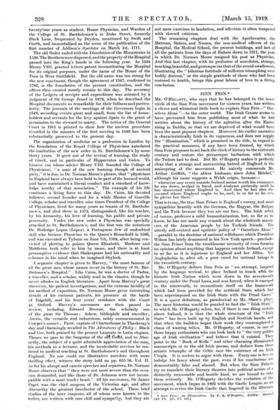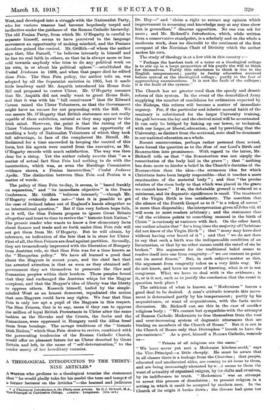SINN FEIN.* Ma. 011EGARTY, who says that he has belonged
to the inner circle of the Sinn Fein movement for sixteen years, has written a clever and whimsical little book to explain Sinn Fein—" Our-
selves Alone "—to the outer world. The Irish Censor seems to have prevented him from publishing most of what he had
written about the history of the agitation after the Easter rising in Dublin, so that we are deprived of what would have been the moat piquant chapters. Moreover, his earlier narrative is characteristically Irish in its vagueness, and does not supply
the " illumination," which is promised in the title, in regard to the practical measures, if any have been framed, by which
Sinn Fein proposes to set back the clock of history to the sixteenth century and restore the picturesque barbarism with which the Tudors had to deal. But Mr. O'Hegarty makes it perfectly clear that a strange and unreasoning hatred of England is the mainspring of the movement. He naively commends Mr. Arthur Griffith, "the ablest Irishman since John Mitchel,' although his name suggests a Welsh origin, because-
" whenever any event outside Ireland seems worth his comment, he sits down, scalpel in hand, and analyses patiently until ha has discovered where England is. And then he has also dos. covered where England ought to be, and, in so far as he can, he places her there."
That is to say, the true Sinn Feiner is England's enemy, and must sympathize heartily with the German, the Magyar, the Bulger, and the Turk because they too an our foes. The Irish rebel, of course, professes a mild humanitarianism, but, so far as we know, he has not made any remark about the wholesale masers ems of the Armenian' people by his Turkish friends. The utterly self-centred and egotistic policy of " Ourselves Alone" —parallel to the doctrine of national selfishness which President Wilson has lately denounced in his New York speech—preclude. the Sinn Feiner from the troublesome necessity of even forming an opinion about anything that happens outside Ireland, except in so far as it is injurious to England and her Allies. Yet Anglophobia is, after all, a poor creed for rational beings in the twentieth century.
Mr. O'Hegarty defines Sinn Fein as "an attempt, inspired by the language revival, to place Ireland in touch with the historic Irish Nation which went down in the seventeenth century under the Penal Laws,and was forced, when it emerged in the nineteenth, to reconstitute itself on the framework which had been provided for the artificial State which had been superimposed on the Irish State with the Penal Laws." It is a queer definition, as paradoxical as Mr. Shaw's play The mere historian would be puzzled to find the " Irish State" to which Mr. O'Hegarty refers, for, if there is one thing certain about Ireland, it is that the whole structure of the " Irish State" has been built up by English and Scottish hands, and that when the builders began their work they contemplated a chaos of warring tribes. Mr. O'Hegarty, of course, is one of those hippy enthusiasts who can look back to " the very golden age of Irish civilization" and believe that it existed. They point to the "Book of Kells " and other charming illuminated manuscripts or to the old Irish poems, and deduce from these artistic triumphs of the Celtic race the existence of an Irish Utopia. It is useless to argue with them. Every one is free to indulge his fancy about the past, even if his conclusions an) demonstrably false and absurd. But when the Sinn Feiners try to translate their literary theories into political action Of distinctly treasonable and hostile kind, we are bound to take them seriously. Mr. O'Hegarty sketches the evolution of the movement, which began in 1893 with the Gaelic League, as 55 attempt to revive the Irish Gaelic that lingered in the illiterate • Sinn Fein as Illansination. Ply P. 8. 018.G.IY. Dom.: 31•55'd and Co. lee. Gi. wt.] West, and developed into a [struggle with the Nationalist Party, who for various reasons had become hopelessly torpid and ineffective under the guidance of the Roman Catholic hierarchy. The old Fenian Party, from which. Mr. O'Hegarty is careful to separate himself, seems to have perceived in the language movement an opportunity of making mischief, and the Fenian,' therefore gained the control. Mr. Griffith—of whom the author says that, like Parnell, "he believes intensely in himself and he has no real faith in others, so that he la always more or lose cold towards anybody who tries to do any political work on his own, in or about his political sphere"—eetablished the United Irishman in 1899, and when that paper died he edited Sian Fein. The Sinn Fein policy, the author tells us, was adopted by all the Separatist societies in 1905, but it made little headway until Mr. Asquith introduced his Home Rule Bill and proposed to coerce Ulster. Mr. O'Hegarty assumes that Mr. Asquith did not really want to grant Home Rule, and that it was with his " full connivance " that Sir Edward Carson raised the Ulster Volunteers, so that the Government might have an excuse for not prqeeeding with the Bill. We can itemize Mr. O'Hegarty that British statesmen are not really capable of these subtleties, natural as they may appear to the Irish mind. However, the, point is that the raising of the Ulster Volunteers gave the Shut Feiners an opportunity of enrolling a body of Nationalist Volunteers of which they took full advantage, in face of the complacent Mr. Birrell. Mr. Redmond for a time succeeded in keeping the control of this force, but his agents were ousted from the executive, as Mr. O'Hegarty records with much satisfaction. The way was then clear for a rising. Yet the author calmly asserts that " as a matter of actual fact Sinn Fein had nothing to do with the insurrection, which was, as even the Harding,' Commission evidence shows, a Fenian insurrection." Credal Judatus Apella. The distinction between Sinn Fein. and Fenian is a matter of words.
The policy of Sinn Fein to-day, it seems, is " based frankly on separation," and "its immediate objective" is the Peace Conference. Mr. Griffith " believes intensely "—though Mr. O'Hegarty evidently does not—" that it is possible to get the ease of Ireland taken out of England's hands altogether as an international question." But if this very forlorn hope fails, as it will, the Sinn Feiner propose to ignore Great Britain altogether and trust to time to revive the " historic, Irish Nation." The prosaic reader who want& to know a few elementary fact; about finance and trade and so forth under. Sinn Fein rule will not get them from Mr. O'Hegarty. But he will obtain, by inference, an indication of the fate that le in store for Ulster First of all, the Shm Feinera are dead against partition. Secondly, they are tremendously impressed with the liberation of Hungary from Austrian rule, so that Sinn Fein was for a time known as the " Hungarian policy." We have all learned a good deal about the. Magyars in recent years, and the chief fact that has arrested attention is that as soon as they obtained self. government they eel themselves to persecute the Slav and Rumanian peoples within their borders. These peoples found that they had exchanged the Austrian whips for the Magyar scorpions, and that the Magyar's idea of liberty was the liberty to oppress others. Kossuth himself, hailed by the simple- minded West as an honest democrat, repudiated the notion that non-Magyars could have any rights. We fear that Sinn Fein is only too apt a pupil of the Magyars in this respect. The Sinn Feiners, that is to say, mean if they can to oppress the million of loyal British Protestants in Ulster after the same fashion as the Slovaks and the Croats, the Serbs and the Rumanians, were oppressed in Hungary until the Allies freed them from bondage. The savage traditions of the " historic Irish Nation," which Slim Fein desires to revive, combined with the persecuting tendencies of the Roman Catholic Church, would offer no pleasant future for an Ulster deserted by Great Britain and left, in the name of "self-determination," to the tender mercy of her hereditary enemies.







































 Previous page
Previous page